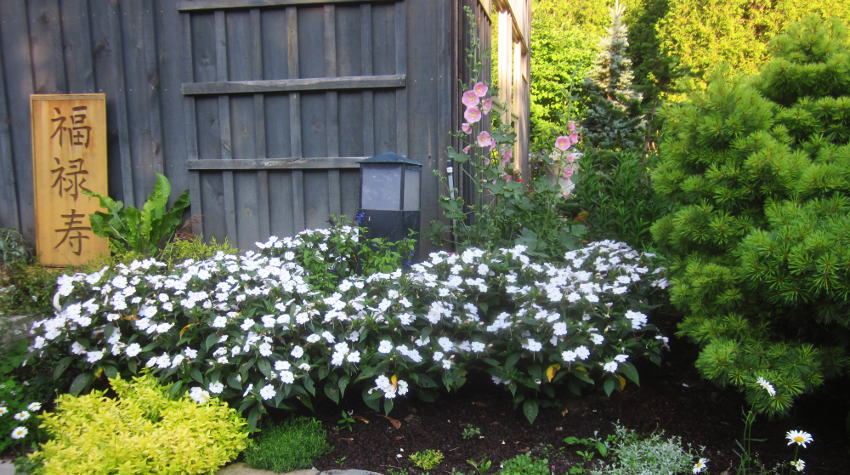Now that pesticides are banned in Ontario, we need to try and keep our gardens as green and healthy as possible. Here are a few of our tips to help you maintain a healthy garden. By no means is this a complete garden guide, just some tidbits we'd suggest.
Before we get too far, remember that I said "Green" not "Organic". To me, Green means healthy and responsible. Organic is more a technicality in my eyes. After all, Nitrogen, even synthetically derived, is still 70% of the air around us. If your garden is healthy and flourishing and you've done it responsibly, then you're Green. I'll leave the official term "Organic" to the politicians. Let's all garden green, organically derived or not, and be happy with our gardens.
- Fertilizing and Top Dressing - Be it synthetic or organic, keep the doses low. Too much fertilizer can damage things. I always use half the rate listed on the package, but fertilize more often. One healthy feast a year is no substitute for a healthy diet all year. Think more about conditioning your soil before adding fertilizers. Big numbers don't necessarily mean big results. Peat Moss or Peat Pellets are a great top-dress for your lawn. Manure should be added to your vegetable and flower gardens annually. Annually mulching beds and trees also adds more micro-nutrients to the soil. Use Lime to counter acidity or Gypsum to break up some clay and prevent bud-rot. If the soil is in good shape, you'll see lots of earthworms which are natures aerators (then you don't need to aerate). Lots of worms = healthy soil = healthy plants. Simple.
- Mowing - Short or long, never cut off more than 1/3 off a plant. The shorter you mow your lawn, the more often you will have to mow your lawn. Putting greens on golf courses are mowed daily and the grass isn't stressed or unhealthy. Some people like long and shaggy grass, but I find dandelions and weeds flower more in long grass. Lawns mowed short very frequently can prevent weeds from flowering and going to seed. Old fashioned reel mowers are best for your grass since they have a more scissor action to cut. Regardless if you like long grass or short grass, just mow it appropriately.
- Showers - This one sounds weird. In the greenhouse, we'll often walk around with a strong jet of water or even run the high-pressure sprayer without pesticides just to knock bugs off plants. It seems somewhat silly, but it does help. Using an old-fashioned impact sprinkler (the tick-tick-tick circular ones) can do this as well. Putting your houseplants in the shower and spraying them off also works wonders. In the wild rain storms and weather does this to keep the checks and balances in place.
- Be Proactive - There are some common issues that need to be addressed every year. Nematodes in June to keep grubs under control. Dormant Oil in the spring on fruit trees and roses keep tent caterpillars and other critters under check. Sulphur applied in the spring can also prevent things like Apple Scab and Black Spot from overwintering. This needs to be done every year, not just when there's a problem. Remember, an ounce of prevention is worth a pound of cure.
- Plant Smart - If our insect and disease control options are more limited, we should select our plants based on our maintenance levels. Fancy roses will probably need more care than a rough rose. Select plants based on the gardening you want to do. If you go away all summer or only want to putter in your garden once every couple of weeks, pick some low-maintenance sure-fire plants. If you don't mind spending a bit of time daily in your garden, go for the fancy and persnickety stuff. Get the plants that suit your lifestyle. You wouldn't buy a Hummer for a 3-minute daily commute and nothing else, would you?
- Keep Your Eyes Open - We all have to be diligent about spotting problems, recognizing what's wrong and fixing it as soon as possible. Regardless of how green you want to be, the fact of the matter is that Insecticidal Soap is not effective on all insects. Nor is Sulphur effective on all diseases. In the end, you need to be ahead of the curve and catch problems early. Killing 80% of 10 bugs is much more helpful to your plant than 80% of 100,000 bugs.
In general, keep your eyes open, keep your garden healthy, and get into an annual routine. It's not overly difficult once you get used to it. Plants can be quite resilient but they can also need a little help. Unfortunately, not everybody will catch every problem in time so there is more chance than pests will spread quickly and that means we all need to take a little extra time and a little extra care to be sure our gardens are healthy.

